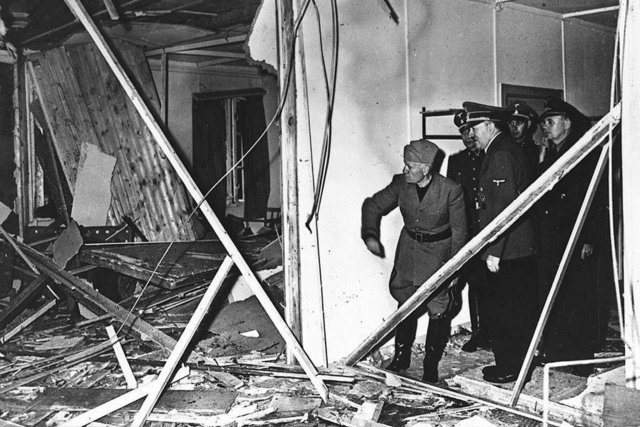
The Plots Against Hitler
By Danny Orbach
Head of Zeus, 2017
406 pages
Nazi Germany is a test case in historical counterfactuals.
If the assassination-plotters and coup-conspirators in the German military had succeeded in their many attempts from 1938 to 1944 to remove Hitler and overthrow the Nazi regime, then entirely different options to years of mass military deaths, civilian slaughter and horrendous concentration camps would have come into play.
The German military resistance against the Nazis almost pulled it off but were dogged by bad luck. This included faulty bomb technology, last-minute changes to Hitler’s schedule, and a mounting frustration that undermined the discipline needed to remain clandestine.
Nonetheless, they came agonisingly close to potentially saving the lives of millions.
Yet, as historian Danny Orbach discusses in The Plots Against Hitler, the military resisters’ entitlement to moral approval has been challenged by revisionist historians. These critics rightly point out that the German military rebels were, with few exceptions, conservative authoritarians.
Some had cooperated with the Nazi regime for many years. Some were mass murderers and war criminals responsible for directing the slaughter of Russians, Poles and Jews. Some were anti-Semites who supported “legal and non-violent” discrimination against Jews in Germany or their expulsion to a Jewish “homeland”.
Some opposed Hitler’s military aggression as avoiding a possible catastrophic German defeat. Some gave a racialist grounds to these concerns, fearing defeat could mean Germany being over-run by “millions of Slavs and Asiatics”.
From this, the critics conclude that, had the military resistance toppled Hitler, Europe may have been spared the vicious worst of Nazism but little would have fundamentally changed in fascist practice in Europe.
Orbach is dissatisfied with both the romanticisation of the military resistance as moral heroes of the anti-Nazi struggle and with the heated indictment against them as insufficiently anti-Nazi.
The loyalty of Germany’s officer caste was to their political leaders. This included the Nazi regime but, for some officers, these early bonds were weakened by professional disagreements with Hitler’s security bodies (the SS and the Gestapo), personal grievances and career marginalisation.
Another factor was strategic policy differences over the scope and timing, but not the aims, of a war drive for territorial expansion.
There was usually a major trigger that turned growing dissent into a dramatic break with the regime. This could be one violent Nazi outrage too many, such as anti-Jewish pogroms or the persecution of non-conformist clergy (all the conspirators held deeply religious beliefs). Others included SS atrocities against Jews, civilians and Russian POWs on the eastern front, which the resisters-in-waiting saw as bringing dishonour on the military.
For example, the best known of the military rebels was Colonel Claus von Stauffenberg, the aristocratic officer and Nazi loyalist who organised Operation Valkyrie, the resisters’ final assassination and coup attempt. He had his Damascene anti-Nazi conversion in response to the SS mobile death squads (Einsatzgruppen), which slaughtered eastern front civilian Jews wholesale.
At one stage, the resisters might have agreed with many Nazi principles. However, their opposition to such violent implementation eventually revealed the inseparability of the conception and execution of Nazi philosophy. A network of military dissidents cohered around their opposition to Hitler’s war crimes and military follies.
The resisters came from the top levels of the army, military intelligence and even the Gestapo. These closet anti-Nazis led a nerve-wracking double life inside Hitler’s war machine as they plotted to arrest or kill Hitler and his top lieutenants. Some were able to save prominent individual Jews from the Holocaust.
Their civilian wing came from the domestic civil service bureaucracy and foreign ministry. They also reached out to a broader popular support base for post-coup legitimacy.
They planned a Nazi-free Germany in concert with centre-left politicians and trade union leaders of the Social Democratic Party, who they slated for top posts in a military-installed post-coup government. Despite the resisters almost always being strongly anti-communist, they even made overtures to the political and paramilitary underground of what was left of the German Communist Party.
The failure of Operation Valkyrie resulted in the crushing of the military resistance. Almost every member was arrested, tortured and executed (unless they beat the Gestapo to it through suicide). The most prominent leaders were hanged with piano wire from meat-hooks to maximise their humiliation and degradation.
The resisters paid with their lives in a bid to save millions of others. This, says Orbach, qualifies them as heroes.
Their anti-Nazi moral integrity, however, comes with clear caveats. It cannot be ruled out that, had they succeeded, they may have relapsed into quasi-authoritarian rule-by-elites, with overtones of the Nazism they had supported in their early careers.
Their self-sacrifice, and profoundly tragic fate, however, indicates an anti-Nazi moral redemption was also a possible outcome for the military rebels who took up arms against Hitler.